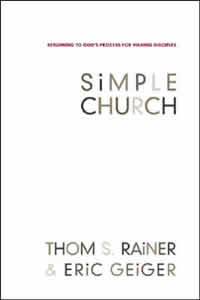Book Notes
 Thom S. Rainer and Eric Geiger, Simple Church; Returning to God's Process for Making Disciples (Nashville: Broadman, 2006), 256pp.
Thom S. Rainer and Eric Geiger, Simple Church; Returning to God's Process for Making Disciples (Nashville: Broadman, 2006), 256pp.
In this extremely simple and simplistic book, the authors make a simple proposal: effective and vital churches are simple, whereas complicated, cluttered, and over-programmed churches are much less vital. At first they had a hunch about this thesis based upon informal empirical observations about churches they noticed. Later, they did a statistical study that, they contend, verified their hypothesis. Finally, and this will come as no surprise, they found their thesis in the Bible. Simplicity, they contend in the subtitle to this book, returns us to "God's process for making disciples." After two thousand years the truth is out.
Appealing unapologetically to corporate models like Google and Apple, according to Rainer and Geiger, "simple is in, complexity is out. . . complexity is not welcome." Keeping to their word, they offer an extraordinarily simple recipe for effective churches. First, they have a strong suspicion that most churches do not need a mere tweak here or there; they believe that most churches need a radical makeover. They need to start with clean sheet engineering. Next, they only need to follow four counsels: clarity, movement, alignment, and focus. Bingo, presto-chango.
A friend gave me this book to read, and I was later surprised to see that it has been hailed as a leading book of the past year in the areas of church and pastoral studies. I suspect that it has tapped in to several overlapping realities— the difficulties ( = complexities!) of pastoring well; the palpable frustrations that pastors experience when they don't; churches that are, in fact, poorly organized, needlessly complicated, and lacking focus; and the natural longing on the part of these pastors for some direct advice about what to do with this sad state of affairs.
Despite the promises and rhetoric, this book, like every other technique and gimmick, will disappoint. No real nuanced definition of what constitutes an "effective" church is given, except, perhaps, for increased attendance. The marks of vitality that the authors return to over and over look suspiciously similar, generic, and already exist in most churches—get parishioners to attend worship, study the Bible, join a small group, and learn to serve. Their study is narrowly limited to what they call "evangelical" churches, whatever that broad category might mean. With the size of an average church in America hovering at around 100 people, it's easy to imagine how a pastor will feel about a case study of a church that grew to 16,000 members in ten years. Finally, I myself have never experienced the Christian life or church as simple, and it strikes me as a false hope to suggest that it is. For an alternative viewpoint on pastoral call and identity, I recommend Henri Nouwen's little gem called In the Name of Jesus; Reflections on Christian Leadership, in which he construes the three temptations of Jesus (and Christian ministers) as the temptations to be relevant, spectacular, and powerful.


